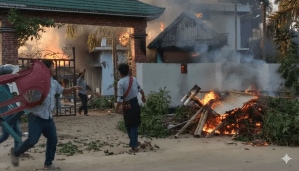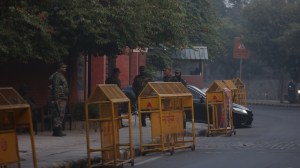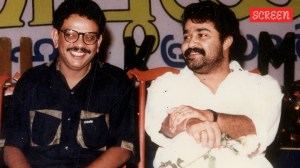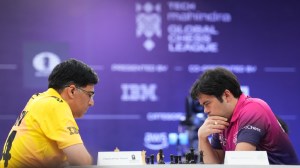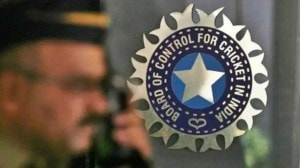A relatively ambiguous crime
The conviction last week of P.V. Narasimha Rao is reminiscent of what happened decades ago with the legendary mafia don of Chicago, Al Cap...

The conviction last week of P.V. Narasimha Rao is reminiscent of what happened decades ago with the legendary mafia don of Chicago, Al Capone. The US authorities tried hard to nail him for serious offences such as murder, extortion and bootlegging. But what got him finally was his relatively innocuous income tax violations. Much the same way, in his long and eventful career, Rao has been accused of some very grave offences 8212; at the bar of the public, if not in a court of law. And what he has been finally convicted for is the relatively ambiguous charge of bribing some MPs to see through a no-confidence motion against his government.
It8217;s a charge that could be sustained only because the recipients of the bribe, the four JMM MPs, were reckless enough to promptly deposit the cash in a bank in their own names. Had they been more discreet, or had Rao and his political managers adopted the more acceptable methods of distributing the spoils of office, there would hardly have been any scope to convict the former Prime Minister. The JMM case is anyway a reversal of the normal pattern of a corruption case in which a person in power is alleged to have received a bribe, not given. It also seems to detract from Article 105 of the Constitution which says quot;no member of Parliament shall be liable to any proceedings in any court in respect of 8230; any vote given by him in Parliament.quot; The Supreme Court cleared the path for Rao8217;s conviction by making an anomalous interpretation of Article 105. On a petition filed by Rao challenging his prosecution in the JMM case, the apex court held that the Constitutional immunity applies only to the bribe taker and notthe bribe giver. There is still much variation around the world on this grey area 8212; the nature and degree of immunity allowed to legislators especially in the face of bribery charges.
Rao8217;s conviction in the JMM case rather than for other more widely recognised crimes is thus a commentary on the quality of the rule of law prevalent in India. Take the kind of allegations made against Rao before the judicial inquiry that started this week into the 1984 massacre of Sikhs in Delhi. The inquiry is in fact being held for the second time because the earlier probe was held by a Supreme Court judge who, after covering up the complicity of Congress leaders in the carnage, became an MP on that party8217;s ticket. Rao was the home minister when, as per the official toll, 2,733 Sikhs were massacred in a span of three days in the Capital following the assassination of Indira Gandhi. It was the biggest carnage since the Partition riots.
As home minister administering the then Union territory of Delhi, Rao was directly responsible for the inaction of the police and the delay in the deployment of the army. But Rao did not assume any responsibility, moral or otherwise, and he carried on as a member of the Rajiv Gandhi cabinet. He got away with that lapse because the Ranganath Misra Commission anyway exonerated the Rajiv Gandhi government. Eminent persons such as art historian Patwant Singh and Bangladesh war hero J.S. Aurora have since filed affidavits before the recently appointed G.T. Nanavati Commission recalling the indifference displayed by Rao when they met him during the riots. As Patwant put it in his affidavit filed last month, Rao quot;was looking impassive and seemingly without a care. The atmosphere at the Home Minister8217;s house did not show at all that there was any crisis.quot;
Eight years later, when he was Prime Minister, Rao was widely accused of similar inaction around the time of the Babri Masjid demolition. In his memoirs, the then home secretary, Madhav Godbole, vividly brought out Rao8217;s complicity in the events leading to the demolition and the communal violence that followed in many parts of the country. Rao was blamed not only by the Opposition leaders but also by his own party leaders like Arjun Singh. But again, Rao carried on with impunity because the criminal case registered over the demolition did not name him among the accused politicians. The conspiracy alleged by the CBI is largely confined to members of the Sangh Parivar while the help rendered to them by Rao with his acts of omission and commission has remained uninvestigated. This aspect has not been touched even by the M.S. Liberhan Commission, which is still dragging on with its inquiry proceedings.
Rao has also had a lucky run with the cases in which he was actually arraigned as an accused. In the St Kitts case, the court discharged him of the allegation of having been involved in an attempt to frame V.P. Singh with forged documents. In the Lakhubhai Pathak case, the complainant passed away while the case is still pending. The CBI appealed in the Supreme Court against his discharge in the St Kitts case and is optimistic that the complainant8217;s death will not affect the other case because Pathak had already been examined by the court. As things stand, Rao has been convicted in a debatable case while the more serious allegations have gone abegging.Rao has got away with charges more serious than the one in the JMM case
- 01
- 02
- 03
- 04
- 05








